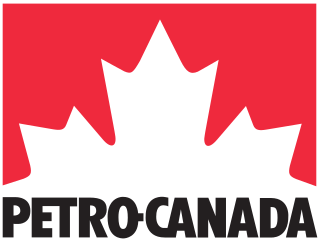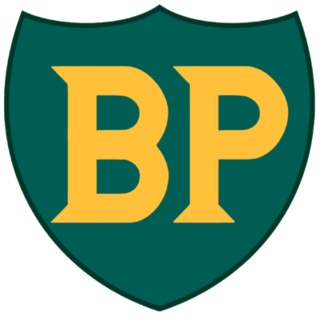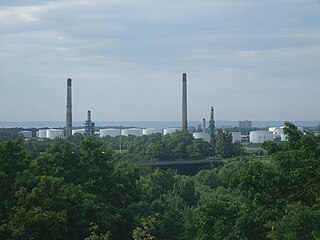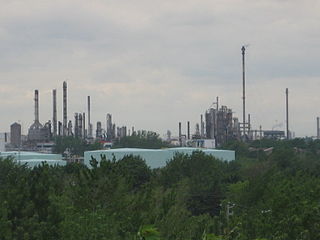
Oil sands, tar sands, crude bitumen, or bituminous sands, are a type of unconventional petroleum deposit. Oil sands are either loose sands or partially consolidated sandstone containing a naturally occurring mixture of sand, clay, and water, soaked with bitumen, a dense and extremely viscous form of petroleum.

The Athabasca oil sands, also known as the Athabasca tar sands, are large deposits of bitumen, a heavy and viscous form of petroleum, located in northeastern Alberta, Canada. These reserves are one of the largest sources of unconventional oil in the world, making Canada a significant player in the global energy market.

Petro-Canada is a retail and wholesale marketing brand subsidiary of Suncor Energy. Until 1991, it was a federal Crown corporation. In August 2009, Petro-Canada merged with Suncor Energy, with Suncor shareholders receiving approximately 60 percent ownership of the combined company and Petro-Canada shareholders receiving approximately 40 percent. The company retained the Suncor Energy name for the merged corporation and its upstream operations. It continues to use the Petro-Canada name nationwide.
Synthetic crude is the output from a bitumen/extra heavy oil upgrader facility used in connection with oil sand production. It may also refer to shale oil, an output from an oil shale pyrolysis. The properties of the synthetic crude depend on the processes used in the upgrading. Typically, it is low in sulfur and has an API gravity of around 30. It is also known as "upgraded crude".

BP Canada was a Canadian petroleum company and subsidiary of British Petroleum that existed between 1955 and 1992. The name refers to a group of companies that engaged in various segments of the petroleum industry lifecycle. BP entered the Canadian market in October 1953, when it purchased a 23 percent stake in the Triad Oil Company. In 1955, BP formed a Canadian subsidiary, based in Montreal, called BP Canada Limited. The company began acquiring retail stations in Ontario and Quebec and in 1957 started construction on a refinery in Montreal. By the end of the 1950s BP Canada was a fully-integrated operation. In 1964, it acquired from Cities Service the Oakville Refinery, and then expanded its operations significantly in 1971 when it acquired Supertest Petroleum.

Clarkson, also called Clarkson Village, is a neighbourhood in the city of Mississauga, Ontario, Canada, situated in the southwest corner of the city, along the shore of Lake Ontario. It is bordered by Lake Ontario to the south, Oakville to the west, Erindale and Erin Mills to the north, and Lorne Park to the east.

Suncor Energy is a Canadian integrated energy company based in Calgary, Alberta. It specializes in production of synthetic crude from oil sands. In the 2020 Forbes Global 2000, Suncor Energy was ranked as the 48th-largest public company in the world.

Bronte is the community that makes up much of the west end of Oakville, in Ontario, Canada. Twelve Mile Creek flows through the middle of town and empties into Lake Ontario. Main roads include Bronte Road (north-south), Lakeshore Road West and Rebecca Street (east-west). Streets in the business section include Lakeshore, Jones, Marine, and Ontario Street. Bronte is also accessed via a superhighway located to the north of the former village. Other main roads include Third Line, Speers Road and Burloak Drive to the west

Petroleum production in Canada is a major industry which is important to the overall economy of North America. Canada has the third largest oil reserves in the world and is the world's fourth largest oil producer and fourth largest oil exporter. In 2019 it produced an average of 750,000 cubic metres per day (4.7 Mbbl/d) of crude oil and equivalent. Of that amount, 64% was upgraded from unconventional oil sands, and the remainder light crude oil, heavy crude oil and natural-gas condensate. Most of the Canadian petroleum production is exported, approximately 600,000 cubic metres per day (3.8 Mbbl/d) in 2019, with 98% of the exports going to the United States. Canada is by far the largest single source of oil imports to the United States, providing 43% of US crude oil imports in 2015.

Canada's oil sands and heavy oil resources are among the world's great petroleum deposits. They include the vast oil sands of northern Alberta, and the heavy oil reservoirs that surround the small city of Lloydminster, which sits on the border between Alberta and Saskatchewan. The extent of these resources is well known, but better technologies to produce oil from them are still being developed.
The Shell Scotford Upgrader is an oilsand upgrader, a facility which processes crude bitumen from oil sands into a wide range of synthetic crude oils. The upgrader is owned by Athabasca Oil Sands Project (AOSP), a joint venture of Shell Canada Energy (60%), Marathon Oil Sands L.P. (20%) and Chevron Canada Limited (20%). The facility is located in the industrial development of Scotford, just to the northeast of Fort Saskatchewan, Alberta in the Edmonton Capital Region.

Indus Refinery Project was a petroleum refinery which was proposed to be established near Karachi, Sindh, Pakistan by Indus Refinery Limited (IRL).

Although there are numerous oil companies operating in Canada, as of 2009, the majority of production, refining and marketing was done by fewer than 20 of them. According to the 2013 edition of Forbes Global 2000, canoils.com and any other list that emphasizes market capitalization and revenue when sizing up companies, as of March 31, 2014 these are the largest Canada-based oil and gas companies.
Shell Oakville Refinery was an oil refinery located at Oakville, Ontario in Canada. It was located south of the Oakville Refinery. It had a processing capacity of 44,000 barrels per day (7,000 m3/d).

The Montreal Refinery is an oil refinery located in the city of Montreal inside the Rivière-des-Prairies–Pointe-aux-Trembles borough. The refinery is not far from the Montreal East Refinery. This refinery is the largest Suncor Energy refinery.
The Cenovus Lloydminster Refinery is an asphalt refinery located in the city of Lloydminster, Alberta, Canada owned by Husky Energy. The refinery provides oil products, primarily 30 different grades of asphalt, as well as light distillate, kerosene distillate, atmospheric gas oil, light vacuum gas oil (VGO), and heavy vacuum gas oil. This refinery is Canada's largest asphalt supplier, processing 27,000 barrels of heavy crude oil per day to produce asphalt. Husky is the "largest marketer of paving asphalt in Western Canada with a 29 mbbls/day capacity asphalt refinery located at Lloydminster, Alberta "integrated with the local heavy oil production, transportation and upgrading infrastructure."
HF Sinclair Corporation is a diversified energy company that manufactures and sells products such as gasoline, diesel fuel, jet fuel, renewable diesel, specialty lubricant products, specialty chemicals, and specialty and modified asphalt, among others. It is based in Dallas, Texas, United States.

The Strathcona Refinery is an oil refinery located in Strathcona County adjacent to Edmonton, Alberta, Canada, owned by Imperial Oil. The refinery provides oil products, primarily gasoline, aviation fuel, diesel, lubricating oils, petroleum waxes, heavy fuel oil and asphalts.
Western Canadian Select (WCS) is a heavy sour blend of crude oil that is one of North America's largest heavy crude oil streams and, historically, its cheapest. It was established in December 2004 as a new heavy oil stream by EnCana, Canadian Natural Resources, Petro-Canada and Talisman Energy. It is composed mostly of bitumen blended with sweet synthetic and condensate diluents and 21 existing streams of both conventional and unconventional Alberta heavy crude oils at the large Husky Midstream General Partnership terminal in Hardisty, Alberta. Western Canadian Select—the benchmark for heavy, acidic crudes—is one of many petroleum products from the Western Canadian Sedimentary Basin oil sands. Calgary-based Husky Energy, now a subsidiary of Cenovus, had joined the initial four founders in 2015.









